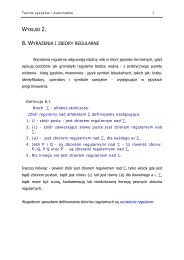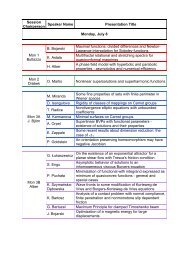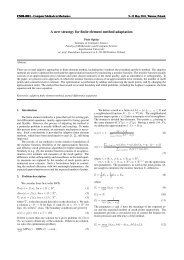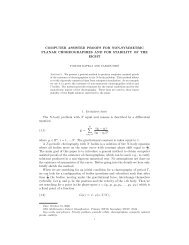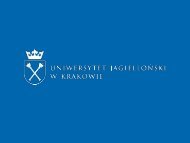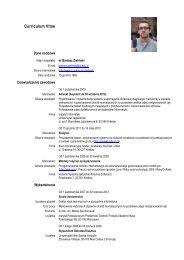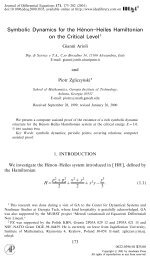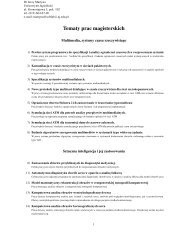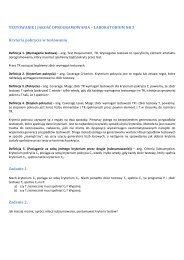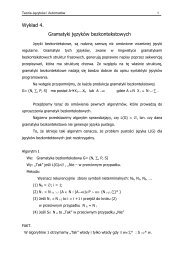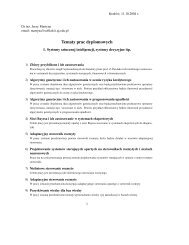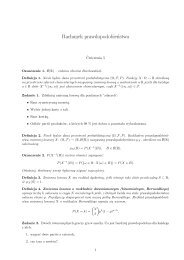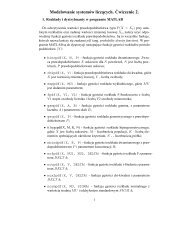Interview with Michael Atiyah and Isadore Singer
Interview with Michael Atiyah and Isadore Singer
Interview with Michael Atiyah and Isadore Singer
You also want an ePaper? Increase the reach of your titles
YUMPU automatically turns print PDFs into web optimized ePapers that Google loves.
INTERVIEW<br />
The Abel lectures were given by I. <strong>Singer</strong>, E. Witten, M. <strong>Atiyah</strong> <strong>and</strong> J.- M. Bismut<br />
Riemann Hypothesis by age thirty, you<br />
might as well commit suicide.” How infantile!<br />
Age means little to me. What keeps me<br />
going is the excitement of what I’m doing<br />
<strong>and</strong> its possibilities. I constantly check [<strong>and</strong><br />
collaborate!] <strong>with</strong> younger colleagues to be<br />
sure that I’m not deluding myself – that<br />
what we are doing is interesting. So I’m<br />
happily active in mathematics. Another reason<br />
is, in a way, a joke. String Theory needs<br />
us! String Theory needs new ideas. Where<br />
will they come from, if not from Sir <strong>Michael</strong><br />
<strong>and</strong> me?<br />
ATIYAH Well, we have some students…<br />
SINGER Anyway, I am very excited about<br />
the interface of geometry <strong>and</strong> physics, <strong>and</strong><br />
delighted to be able to work at that frontier.<br />
History of the EMS<br />
You, Prof. <strong>Atiyah</strong>, have been very much<br />
involved in the establishment of the<br />
European Mathematical Society around<br />
1990. Are you satisfied <strong>with</strong> its development<br />
since then?<br />
ATIYAH Let me just comment a little on<br />
my involvement. It started an awful long<br />
time ago, probably about 30 years ago.<br />
When I started trying to get people interested<br />
in forming a European Mathematical<br />
Society in the same spirit as the European<br />
Physical Society, I thought it would be easy.<br />
I got mathematicians from different countries<br />
together <strong>and</strong> it was like a mini-UN: the<br />
French <strong>and</strong> the Germans wouldn’t agree; we<br />
spent years arguing about differences, <strong>and</strong> –<br />
unlike in the real UN – where eventually at<br />
the end of the day you are dealing <strong>with</strong> real<br />
problems of the world <strong>and</strong> you have to come<br />
to an agreement sometime; in mathematics,<br />
it was not absolutely essential. We went on<br />
for probably 15 years, before we founded<br />
the EMS.<br />
On the one h<strong>and</strong>, mathematicians have<br />
much more in common than politicians, we<br />
are international in our mathematical life, it<br />
is easy to talk to colleagues from other<br />
30<br />
countries; on the other h<strong>and</strong>, mathematicians<br />
are much more argumentative. When<br />
it comes to the fine details of a constitution,<br />
then they are terrible; they are worse than<br />
lawyers. But eventually – in principle – the<br />
good will was there for collaboration.<br />
Fortunately, the timing was right. In the<br />
meantime, Europe had solved some of its<br />
other problems: the Berlin Wall had come<br />
down – so suddenly there was a new Europe<br />
to be involved in the EMS. This very fact<br />
made it possible to get a lot more people<br />
interested in it. It gave an opportunity for a<br />
broader base of the EMS <strong>with</strong> more opportunities<br />
<strong>and</strong> also relations to the European<br />
Commission <strong>and</strong> so on.<br />
Having been involved <strong>with</strong> the set-up, I<br />
<strong>with</strong>drew <strong>and</strong> left it to others to carry on. I<br />
have not followed in detail what has been<br />
happening except that it seems to be active.<br />
I get my Newsletter, <strong>and</strong> I see what is going<br />
on.<br />
Roughly at the same time as the collapse<br />
of the Berlin Wall, mathematicians in general<br />
– both in Europe <strong>and</strong> in the USA –<br />
began to be more aware of their need to be<br />
socially involved <strong>and</strong> that mathematics had<br />
an important role to play in society. Instead<br />
of being shut up in their universities doing<br />
just their mathematics, they felt that there<br />
was some pressure to get out <strong>and</strong> get<br />
involved in education, etc. The EMS took<br />
on this role at a European level, <strong>and</strong> the<br />
EMS congresses – I was involved in the one<br />
in Barcelona – definitely made an attempt to<br />
interact <strong>with</strong> the public. I think that these<br />
are additional opportunities over <strong>and</strong> above<br />
the old-fashioned role of learned societies.<br />
There are a lot of opportunities both in terms<br />
of the geography of Europe <strong>and</strong> in terms of<br />
the broader reach.<br />
Europe is getting ever larger: when we<br />
started we had discussions about where<br />
were the borders of Europe. We met people<br />
from Georgia, who told us very clearly, that<br />
the boundary of Europe is this river on the<br />
other side of Georgia; they were very keen<br />
to make sure that Georgia is part of Europe.<br />
Now, the politicians have to decide where<br />
the borders of Europe are.<br />
It is good that the EMS exists; but you<br />
should think rather broadly about how it is<br />
evolving as Europe evolves, as the world<br />
evolves, as mathematics evolves. What<br />
should its function be? How should it relate<br />
to national societies? How should it relate<br />
to the AMS? How should it relate to the<br />
governmental bodies? It is an opportunity!<br />
It has a role to play!<br />
Apart from mathematics…<br />
Could you tell us in a few words about your<br />
main interests besides mathematics?<br />
SINGER I love to play tennis, <strong>and</strong> I try to<br />
do so 2-3 times a week. That refreshes me<br />
<strong>and</strong> I think that it has helped me work hard<br />
in mathematics all these years.<br />
ATIYAH Well, I do not have his energy! I<br />
like to walk in the hills, the Scottish hills – I<br />
have retired partly to Scotl<strong>and</strong>. In<br />
Cambridge, where I was before, the highest<br />
hill was about this (gesture) big. Of course<br />
you have got even bigger ones in Norway. I<br />
spent a lot of my time outdoors <strong>and</strong> I like to<br />
plant trees, I like nature. I believe that if you<br />
do mathematics, you need a good relaxation<br />
which is not intellectual – being outside in<br />
the open air, climbing a mountain, working<br />
in your garden. But you actually do mathematics<br />
meanwhile. While you go for a long<br />
walk in the hills or you work in your garden<br />
– the ideas can still carry on. My wife complains,<br />
because when I walk she knows I am<br />
thinking of mathematics.<br />
SINGER I can assure you, tennis does not<br />
allow that!<br />
Thank you very much on behalf of the<br />
Norwegian, the Danish, <strong>and</strong> the European<br />
Mathematical Societies!<br />
The interviewers were Martin Raussen,<br />
Aalborg University, Denmark, <strong>and</strong><br />
Christian Skau, Norwegian University of<br />
Science <strong>and</strong> Technology, Trondheim,<br />
Norway.<br />
1 More details were given in the laureates’<br />
lectures.<br />
2 Among those: Newton, Gauss, Cauchy,<br />
Laplace, Abel, Jacobi, Riemann,<br />
Weierstrass, Lie, Picard, Poincaré,<br />
Castelnuovo, Enriques, Severi, Hilbert,<br />
Lefschetz, Hodge, Todd, Leray, Cartan,<br />
Serre, Kodaira, Spencer, Dirac,<br />
Pontrjagin, Chern, Weil, Borel,<br />
Hirzebruch, Bott, Eilenberg,<br />
Grothendieck, Hörm<strong>and</strong>er, Nirenberg.<br />
3 Comm. Pure App. Math. 13(1), 1960.<br />
EMS September 2004



